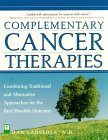Complementary Cancer Therapies
encontrar mi
Author: Dan Labriola, ND OncoLink Rating: |
It is clear many cancer patients are utilizing unconventional medical therapies in combination with conventional cancer treatments. Often patients use these treatments without reliable guidance or accurate information. Many times patients use these treatments without the knowledge of their physicians. It is also clear that many complementary treatments have side effects. Just because something is natural does not mean it is safe.
Dan Labriola has created an important resource for those patients looking to safely add complementary treatments to their conventional cancer treatments. The book emphasizes carefully planning the utilization of complementary treatments in conjunction with the medical, surgical, and radiation oncologists before starting any unconventional therapy. It is emphasized that "serious risks can be involved in both natural and conventional therapies and in combining the two." Important interactions between conventional and unconventional therapies are highlighted throughout the book.
Although there are some controversial aspects to the book, the author does make responsible recommendations throughout. The author is careful not to make any recommendations that may cause harm and always reminds patients to consult their oncologist when considering integrating these therapies. The book also notifies the reader when there is inadequate information available to make any recommendations regarding a particular therapy.
There is a valuable section titled "A Guide to Nonconventional Therapies for the Treatment of Cancer." It discusses a number of therapies that are currently promoted as both complementary and alternative cancer treatments. There is a brief outline of each treatment including the proposed antitumor actions, other actions, toxicity, and suggested uses.
Overall the book is well organized, informative, and responsible. Complementary Cancer Therapies is recommended for the cancer patient that is interested in integrating these therapies with their conventional cancer treatment. OncoLink strongly supports the recommendation that cancer patients considering unconventional therapies fully discuss these treatments with their oncologist.


